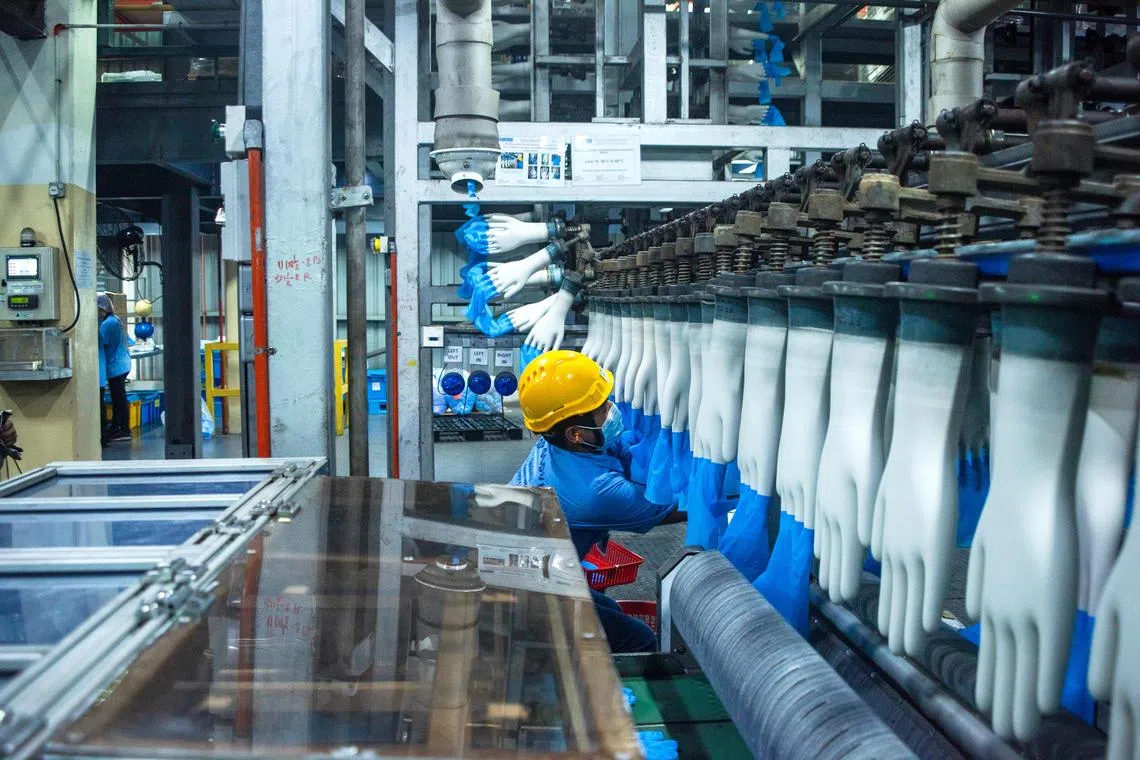Malaysia’s export-oriented businesses fret as deadline for US tariff deal draws near
Sign up now: Get ST's newsletters delivered to your inbox

Local manufacturers such as those in the electrical and electronics sector are particularly worried about the US tariffs threats.
PHOTO: BLOOMBERG
Follow topic:
- Malaysia's export reliant economy could face risks as the US threats to impose higher tariffs on “transshipped goods”. This is part of the Trump administration’s attempt to curb the practice of rerouting Chinese products through a third country to avoid US duties
- Washington had earlier said it would impose an unspecified additional levy on transshipment goods via Malaysia. It has not yet defined what percentage of Chinese input would classify the goods as such.
- Malaysia has moved to address transshipment concerns by restricting the way certificates of origin are issued and tightening the movement of high-end chips from the US.
AI generated
KUALA LUMPUR – As Malaysian trade negotiators race against the clock to seal a deal that could reduce the Trump administration’s 25 per cent tariff rate before the Aug 1 deadline, the business community continues to grapple with the uncertainty.
Given the economy is heavily reliant on exports – with export figures at RM1.5 trillion (S$450 billion) in 2024 – local manufacturers such as those in the electrical and electronics and furniture sectors are particularly worried about US President Donald Trump’s threat to impose higher tariffs on “trans-shipped goods”.
This is the Trump administration’s attempt to curb the practice of re-routing Chinese products through a third country before they are exported to the US in order to disguise their true origin and evade US duties.
This common practice is legal in global supply chains under regulations issued by individual countries. But it can and has been abused to evade duties.
Washington had earlier said it would impose an unspecified additional levy on trans-shipment goods via Malaysia.
It has not yet defined what percentage of Chinese input would classify the goods as such.
Mr Soh Thian Lai, president of the Federation of Malaysian Manufacturing, said the threat of US enforcement actions that target China-based supply chains will weigh down the competitiveness of Malaysia’s exports, as the country is a regional manufacturing hub and is deeply integrated with Chinese intermediate goods.
An intermediate good is a product – for example, steel – used in the production of a finished or final good, such as a stainless steel wok.
Although there are no available figures for intermediate goods imported from China, Malaysia recorded imports of intermediate goods totalling RM748.9 billion in 2024, representing a 74 per cent increase from 2020.
Separately, Malaysia imported RM296.5 billion worth of goods from China in 2024, a 72 per cent increase from 2020.
Tan Sri Soh said that, in recent years, global supply chains have shifted or expanded out of China.
This has made the regional value chains all the more complex, and will make decoupling from China difficult.
Mr Soh said Malaysian manufacturers in sectors such as electronics, medical devices and engineered parts, who are locked into long-term contracts and operate on tight margins, will be especially hurt by the upcoming 25 per cent tariff imposed by the US.
Malaysia’s electrical and electronics sector is also heavily reliant on sourcing silicon from China.
But Mr Keat Yap of global management consultancy Kearney is of the belief that these Malaysia-made goods should not be categorised as trans-shipment products.
In 2024, China accounted for 80 per cent of global silicon production.
“Even if the silicon comes from China, it cannot function as a chip until it is diced into pieces, assembled with electrical connectivity, encapsulated for protection against elements, and then tested... In reality, these are not trans-shipped goods, as there are significant value additions in Malaysia,” Mr Yap told The Straits Times.
Malaysia ships a significant portion of its electrical and electronics sector products to the US.
In 2024, such goods, including semiconductor and telecommunications equipment, made up 60 per cent of its exports to the US and were valued at RM119.86 billion.
To address Washington’s concerns regarding trans-shipment and increasing scrutiny over the allegedly fraudulent origin claims of Malaysian products, the Ministry of Investment, Trade and Industry (Miti) in May revoked the authority of organisations
Industry sources who ST spoke to in May said there have been cases of Chinese manufacturers using Malaysia as a trans-shipment hub, allegedly going as far as to falsify certificates of origin in an effort to bypass US tariffs.
The ministry is now the sole body authorised to issue NPCOs.
These documents are used to certify the origin of goods for international shipments, helping to fulfil Customs or trade requirements in the destination country.
Muar Furniture Association president Steve Ong welcomed Miti’s stricter move on NPCOs, saying it would protect Malaysia’s wooden furniture export industry, valued at RM9.89 billion in 2024, half of which was shipped to the US. “It is now harder for exporters to obtain fake certificates of origin for trans-shipment,” he said.
“However, Malaysia still faces higher tariffs compared with neighbours like Indonesia, which enjoys a 19 per cent rate,
Miti on July 14 also tightened the oversight of the movement of high-end chips from the US by imposing a strategic trade permit
Regionally, the US has levied a tariff of 36 per cent against Thailand’s exports
Vietnam secured a deal on July 3 for a 20 per cent tariff rate and a 40 per cent rate on goods deemed to be trans-shipped.

Malaysia's Trade Minister Tengku Zafrul Aziz speaking during a press conference regarding US tariffs in Kuala Lumpur on April 7.
PHOTO: AFP
Earlier in May, the US Department of Justice’s (DOJ) criminal division issued a memo detailing the “threats to the US economy” where it listed “tariff evasion” as a priority area it must tackle as part of combatting white-collar crime. Washington later in June reached a trade deal with China, which saw duties on Chinese goods cut to around 55 per cent – down sharply from a previous 145 per cent.
AmBank Group chief economist Firdaos Rosli said that comparing tariff rates between countries should not be the main focus for Malaysia, given the broader uncertainty posed by Mr Trump’s trade policies.
“Although the US is a major global consumer market, the world is bigger... Perhaps we should focus more on trading among ourselves rather than relying so heavily on a single nation,” he said.
Mr Artie McConnell, a former US DOJ prosecutor turned consultant, said the lack of a common definition and the high burden of proof needed by prosecutors to show that trans-shipping has occurred could hinder Mr Trump’s efforts to criminalise the practice.
“When you have, say, a chemical mixture or a high-end electronic item, and there’s no precedent under the (World Trade Organisation’s) Harmonised Tariff Schedule, classifying the item can be very difficult,” Mr McConnell, now a partner at US law firm BakerHostetler, told a forum organised by Malaysian law firm Skrine on July 15.
He advised firms to implement basic compliance programmes, such as having essential paperwork in order.
With these processes in place, he said, “(the firm would have) already completed 90 per cent of the work” to ready oneself for the new era of tariffs.


